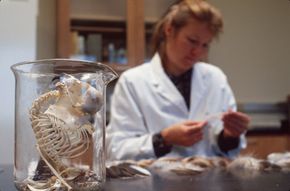Quck answer
Animal detectives work by using a combination of science, technology, and investigative techniques to solve crimes involving animals. These crimes can range from animal abuse and neglect to illegal wildlife trafficking. Animal detectives may use forensic analysis, such as DNA testing and autopsies, to gather evidence and identify suspects. They may also use undercover operations and surveillance to catch criminals in the act. Animal detectives work closely with law enforcement agencies, animal welfare organizations, and other experts in the field to ensure the safety and well-being of animals. Their work helps to hold perpetrators accountable and prevent future crimes against animals.
Animal Facts
Animal Forensics: Investigating Crimes Against Animals

At a crime scene, investigators gather bone fragments, blood, and other evidence to piece together a case of alleged animal abuse. Animal forensics has become an increasingly important tool for organizations like the ASPCA and the U.S. Department of the Interior in investigating crimes against animals. These detectives use forensic science to examine physical evidence and determine if a crime occurred and who may have committed it.
The U.S. Fish and Wildlife Service Forensics Laboratory in Ashland, Oregon is the only lab of its kind in the world. Its mission is to assist law enforcement officers and inspectors at the federal and state levels, as well as in 173 other countries. The lab is divided into seven branches, each using specialized techniques to examine evidence such as bones, blood, hair, feathers, and other parts of an animal’s anatomy. Pathology specialists examine carcasses and wounds to determine cause of death, while genetics experts use DNA analysis to identify an animal’s species and gender.
Becoming an animal detective requires a combination of education and experience, including a degree in forensic science or a related field, as well as experience in veterinary medicine or law enforcement. By using the tools of forensic science and the dedication of animal lovers, animal detectives are helping to ensure that crimes against animals are not committed with impunity.
The Convention on International Trade in Endangered Species (CITES)
The Convention on International Trade in Endangered Species of Wild Fauna and Flora (CITES) is a voluntary international agreement among 173 countries. Its purpose is to regulate international trade in wild animals and plants to ensure that endangered species are not threatened or exploited.
The CITES agreement was created in 1963 by the International Union for Conservation of Nature (IUCN) and safeguards over 30,000 species of live flora and fauna, along with furs, dried herbs, and other items made from protected species. For additional details on CITES, please visit http://www.cites.org/.
FAQ
1. What is an animal detective?
An animal detective is a professional who investigates crimes related to animals. They may work for law enforcement agencies or private organizations and are trained to handle cases involving animal cruelty, wildlife trafficking, and illegal hunting.
2. What are the qualifications required to become an animal detective?
There are no specific qualifications required to become an animal detective, but most professionals have a background in law enforcement or animal-related fields such as veterinary science, biology, or zoology. They also undergo specialized training in animal law, forensic science, and investigative techniques.
3. What kind of cases do animal detectives handle?
Animal detectives handle a wide range of cases related to animal crimes, including animal abuse, neglect, abandonment, and illegal hunting. They may also investigate cases related to wildlife trafficking, animal hoarding, and organized animal fighting rings.
4. What methods do animal detectives use to solve cases?
Animal detectives use a variety of methods to solve cases, including forensic analysis, surveillance, and undercover investigations. They may also work with other law enforcement agencies, such as the police or the FBI, to gather evidence and build cases against suspects.
5. How do animal detectives help animals in need?
Animal detectives not only investigate crimes related to animals, but they also help rescue and rehabilitate animals in need. They work with animal shelters, wildlife rehabilitation centers, and other organizations to provide care and support for animals that have been victims of abuse, neglect, or other crimes.
6. What challenges do animal detectives face on the job?
Animal detectives face a number of challenges on the job, including dealing with dangerous animals and hostile suspects, working long hours and in challenging environments, and dealing with emotionally difficult cases involving animal abuse and neglect. They also face the challenge of working with limited resources and funding.
7. How can people support the work of animal detectives?
People can support the work of animal detectives by reporting suspected animal abuse or neglect to local law enforcement agencies or animal welfare organizations. They can also volunteer or donate to organizations that support animal rescue and rehabilitation efforts, and advocate for stronger animal protection laws and penalties for animal crimes.





Leave a Reply